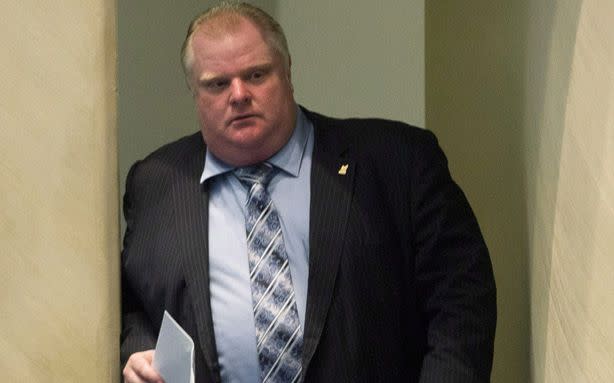Toronto Mayor Rob Ford Has Inspired an Entire Collection of Fan Fiction
MORE FROM THE ATLANTIC CITIES
Emily Keeler, editor of Toronto-based magazine Little Brother, reads a lot of literature for a living. But for the past six weeks, she confesses she's found the news stories coming out of Toronto City Hall more entertaining than most of the novels she's read this year. Thanks to the ongoing scandal surrounding Mayor Rob Ford and the existence of a video that allegedly shows him smoking crack cocaine, there's been no shortage of what she describes as "outrageous and beguiling" material to spark her imagination.
RELATED: Is Toronto City Councillor Doug Ford, Rob's Brother, a Former Hash Dealer?
One particular story in the National Post, which chronicled the bizarre history of the apartment unit where drug dealers may have stashed the alleged crack video, stood out to her.
RELATED: Police Just Raided the Complex Where Rob Ford's Video Might've Been Stashed
"I kept reading it over and over that day, thinking how dark it was and that I wanted so badly for it to be a short story," says Keeler. "I'm the kind of person who needs fiction to help me think, so at 2:00 in the morning I sent out an email to some of the writers I know, and that was that."
RELATED: The Book World Owes a Lot to Stephenie Meyer
"That" is 51 pages of Rob Ford fan fiction published in the newest issue of Little Brother, titled "Everything is Fine."
RELATED: Toronto Mayor: Crack Video Doesn't Exist, Reporters Are 'A Bunch of Maggots'
RELATED: Of Course Mick Jagger Made an NSA Joke About Obama on Stage Last Night
The issue includes 11 short stories written by local authors, all channeling their complex feelings about the circus that has surrounded their city's government since Gawker and the Toronto Star first reported the existence of the crack video. It's a wide-ranging and surreal collection of fiction focused on man who in real life is awfully hard to understand.
Keeler didn't have a hard time recruiting her favorite writers to take part. "I emailed 23 people. Everyone who got back to me, whether they ended up contributing to the zine or not, seemed legitimately thrilled," says Keeler. "I get the sense that I wasn't the only one who felt so incomprehensibly addicted to the unfolding Ford saga that it was hard to get any work done."
Below, a taste of how two of Little Brother's writers have re-imagined their embattled mayor.
Excerpted from Natalie Zina Walschots's “ROBot Ford”:
Doug had been a lonely kid. All he’d ever wanted was someone to talk to, someone who’d understand how overshadowed and ignored he felt. He was smarter than most people expected and when he’d started experimenting with electronics and synthesizers, he felt powerful. In control. Of course, he named his first creation ROBot, ROB for short. It was a child’s creation—jerky and prone to breaking—but it was something that was his, something he loved.
He might have been bright, but Doug was also impatient. He never really took the time to properly repair ROB; instead, he just kept adding to him, not so much improving as accreting, turning ROB into a vast, additive sculpture. That’s why it ended up becoming so big; he just added newer, more advanced circuitry around the original, bug-ridden core. Later he would wrap layers and layers of silicone around the whole mess to pass ROB off as human. There was no real way Doug could repair what he had made now, though he had tried, by God he’d tried. The layers were too deep and dense, the original programming too old. So he just kept enrobing his creation in newer parts and layers of faux flesh, so long as it stayed recognizably human.
All bluster and bleary energy, ROB had become magnetic—powerful. When it had entered municipal politics, Doug had come along, to help and to guard it. He’d never imagined anyone would actually vote for the thing, let alone elect it mayor.
Excerpted form Stephen Thomas's “Inside”:
“Did you party when you were younger, Roman?” says Ford.
It’s nearing twilight now. The field is etiolated, yet still hot.
The package is late.
“Sir?”
“Party. You know. Hang out with musicians. Do drugs. Dance. Get stupid. I used to hang around with these guys. It was an amazing time. It was friendly. Very friendly. Great people, musicians.”
“My cousin plays tymps in an orchestra, sir,” says Urquhart, tamping a cigarette on his hand. “In Miskolc.”
The sky above the field is the colour of old jeans.
“Is that so,” says Ford. “Tell me, son. Did you ever do cocaine?”
“I never have, no,” says Urquhart.
“Makes you feel pretty good,” says Ford. “Like some kind of goddamn machine.”
To order a copy of Everything is Fine, click here.

